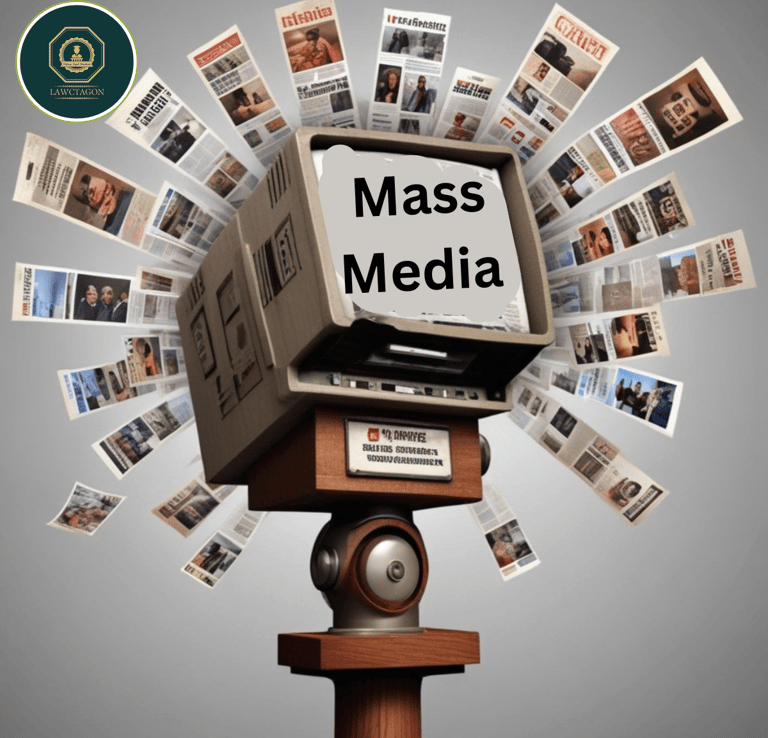INTERPRETATION OF THE ROLE OF THE MASS MEDIA IN A DEMOCRATIC COUNTRY
In this blog, the role of mass media as the fourth pillar of democracy is explored, highlighting its evolution from radio to electronic media and its critical function in shaping public opinion. The post examines mass media's impact in democratic nations like India and the USA, the relationship between media and crime, relevant laws, and the significance of freedom of the press in maintaining a transparent and accountable government.
Vanshika
6/1/20243 min read


Mass media fourth pillar of democracy
INTRODUCTION
How do we look at the fourth pillar of the Democracy? In a democratic country, mass media is taken up as the 4th pillar of democracy which makes effective relationships between the public and the government possible. With time there have been structural changes in the mass media, from radio to print media to electronic media. Public opinion which is the first and foremost important matter in democracy has been made with the help of the mass media.
Mass Media
Mass media is the setup for the communication of information at the mass level through the radio, print newspapers, and electronic media. It helps in the formation of public opinion and in the communication of government schemes. If we see in a democratic country the mass media is a bridge between the government and the people because it is the only medium to provide information about the work done by their chosen representatives for their welfare.
The situation of the mass media depends on the form of government that is prevailing in the country. Like in India, Freedom of the Press is one of facet of the fundamental right – freedom of speech and expression enshrined in Article 19(1)(a) of the Indian Constitution. Whereas in North Korea, Article 67 of the North Korean Constitution protects freedom of speech and freedom of the press. In practice, however, the press is tightly controlled by the state, and the government only allows speech that supports it.
The important structure in the mass media is –
1. Radio
2. Print media
3. Electronic media
Role of Mass Media in the Democratic Countries
In India
In the Indian Constitution, the citizens have the right to speech and expression, which is enshrined in Article 19(1)(a), with some restrictions like not to harm the public peace, sovereignty, and integrity of the nation. If we interpret the right to speech then one of the facets of this right is freedom of the press, which is necessary for political liberty and democracy.
The media, print newspapers in daily to daily life, helps in providing information about the whole world, which is related to the government machinery, entertainment, education, business news and political changes in the neighbour countries like the relations, border disputes, and foreign policies; form public opinion, support public demand.
Mass media and crimes
Is there any relationship between these two terms? At present situation, the rate of crimes increases day by day which is only known to the world through the mass media. Only after the crimes are committed do the people raise their voice for the victims but nobody is there for their help. Only to gain popularity for their own media houses, they increase the topic, not for the justice of victims, which is one of the disadvantages of mass media in India.
In India, there are various laws enacted for the proper regulation and functioning of the mass media, which plays the role of a control mechanism on the mass media. Various Ministries were established for the mass media like the Ministry of Information And Broadcasting.
Ministry of Information and Broadcasting [i]: The Ministry of Information and Broadcasting is one of the ministries set up after India’s independence. The ministry is entrusted with the task of information about government policies, schemes and programmes through the different mediums of mass communication COVERING radio, television, press, social media, etc.
Mass Media Laws
1. Press and Registration of Books Act, 1867 - This act was enacted for the regulation of the printing- presses and the newspaper, for the preservation of copies of books and the newspapers printed in India and for the registration of such.
2. Delivery of Books and Newspapers (Public Libraries) Act, 1954 – this act was enacted for the delivery of books in public libraries and national libraries.
3. The Newspaper (Price and Page) Act, 1956 – This act was enacted the regulate the prices charged for newspapers in relation to their pages and to prevent unfair competition among newspapers.
In the USA
In the USA, there is a representative democracy. The mass media have a very important role in the USA. The mass media in the USA consists of newspapers, magazines, radio, websites, etc. In the USA, mass media works as the fourth pillar. New York City is the leading newspaper in the USA. Through the First Amendment to the United States Constitution, freedom of the press in the United States is legally protected, as are opinions, without interference.
Conclusion
The mass media is independent only when it is not unconstitutional to the Supreme Law that prevails in the country. The foremost work of the mass media is to form a bridge between the government and the public. It works as the fourth pillar of democracy when its function is transparent without any corruption.


